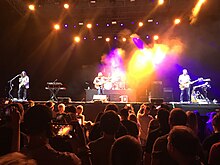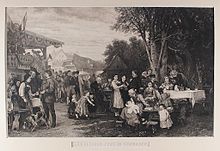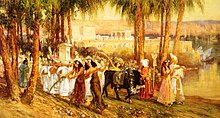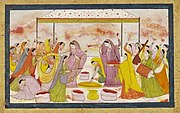Festival

A festival is an event celebrated by a community and centering on some characteristic aspect or aspects of that community and its
Festivals often serve to fulfill specific communal purposes, especially in regard to commemoration or thanking to the gods, goddesses or saints: they are called
Etymology



The word "festival" was originally used as an adjective from the late fourteenth century, deriving from Latin via Old French.[6] In Middle English, a "festival dai" was a religious holiday.[7]
The first recorded used of the word "festival" as a noun was in 1589 (as "Festifall").[6] Feast first came into usage as a noun c. 1200,[8] and its first recorded use as a verb was circa 1300.[9]
The word gala comes from Arabic word khil'a, meaning robe of honor.[10] The word gala was initially used to describe "festive dress", but came to be a synonym of "festival" starting in the 18th century.[11]
History
Festivals have long been significant in human culture and are found in virtually all cultures.
Traditions
Many festivals have religious origins and entwine cultural and religious significance in traditional activities. The most important religious festivals such as Christmas, Rosh Hashanah, Diwali, Eid-al-Fitr and Eid-al-Adha serve to mark out the year. Others, such as harvest festivals, celebrate seasonal change. Events of historical significance, such as important military victories or other nation-building events also provide the impetus for a festival. An early example is the festival established by Ancient Egyptian Pharaoh Ramesses III celebrating his victory over the Libyans.[21] In many countries, royal holidays commemorate dynastic events just as agricultural holidays are about harvests. Festivals are often commemorated annually.
There are numerous types of festivals in the world and most countries celebrate important events or traditions with traditional cultural events and activities. Most culminate in the consumption of specially prepared food (showing the connection to "feasting") and they bring people together. Festivals are also strongly associated with national holidays. Lists of national festivals are published to make participation easier.[22]
Types of festivals
The scale of festivals varies; in location and attendance, they may range from a local to national level.[23][16] Music festivals, for example, often bring together disparate groups of people, such that they are both localised and global.[24] The "vast majority" of festivals are, however, local, modest and populist.[25] The abundance of festivals significantly hinders quantifying the total there of.[14] There exists significant variation among festivals, beyond binary dichotomies of sacred and secular, rural and urban, people and establishment.[25]
Religious festivals
Among many
In the
Arts festivals
Among the many offspring of general arts festivals are also more specific types of festivals, including ones that showcase intellectual or creative achievement such as
Film festivals involve the screenings of several different films, and are usually held annually. Some of the most significant film festivals include the Berlin International Film Festival, the Venice Film Festival and the Cannes Film Festival.
-
Pushkin Poetry Festival, Russia
-
Television studio at the Hôtel Martinez during the Cannes Film Festival, France (2006)
-
The opening ceremony at the Woodstock rock festival, United States (1969)
A food festival is an event celebrating food or drink. These often highlight the output of producers from a certain region. Some food festivals are focused on a particular item of food, such as the National Peanut Festival in the United States, or the Galway International Oyster Festival in Ireland. There are also specific beverage festivals, such as the famous Oktoberfest in Germany for beer. Many countries hold festivals to celebrate wine. One example is the global celebration of the arrival of Beaujolais nouveau, which involves shipping the new wine around the world for its release date on the third Thursday of November each year.[36][37] Both Beaujolais nouveau and the Japanese rice wine sake are associated with harvest time. In the Philippines, there are at least two hundred festivals dedicated to food and drinks.[citation needed]
-
Soweto Wine Festival, South Africa (2009)
-
Holi India (2011)
-
La Tomatina, Spain (2010)
-
Beer horse cart from the Hofbräuhaus brewery at Oktoberfest Germany (2013)
Seasonal and harvest festivals
Seasonal festivals, such as
-
Temple Festival in India
-
Midsummer dance by Anders Zorn, Sweden (1897)
-
Grand Parade at the Sydney Royal Easter Show, Australia (2009)
-
Halloween pumpkins show the close relationship between a harvest and religious festivals
Politics
Scholarly literature notes that festivals functionally disseminate political values and meaning, such as ownership of place, which undergoes transformation in accordance with the festival.[5][25] Furthermore, a festival may act as an artefact which allows citizens to achieve "certain ideals", including those of identity and ideology.[40] Festivals may be used to rehabilitate or elevate the image of a city; the ephemerality of festivals means that their impact is often incorporeal, of name, memory and perception.[14][25] In deviating from routine, festivals may reinforce the convention, be it social, cultural or economic.[16][25]
Study of festivals
- fungi and animalsassociated with cultural events such as festivals, processions and special occasions.
- Heortology – the study of religious festivals. It was originally only used in respect of Christian festivals,[41] but it now covers all religions, in particular those of Ancient Greece.[42] See list of foods with religious symbolism for some topical overlap.
See also
References
- ^ "By the numbers: Musikfest 2023". WFMZ.com. August 15, 2023.
- ISBN 978-0-415-25225-6.
- ^ "Why festivals are important". www.thenews.com.pk. Retrieved February 10, 2023.
- ^ S2CID 225693273.
- ^ from the original on August 28, 2022. Retrieved August 21, 2022.
- ^ OED Online. Oxford University Press. March 2014. Archived from the originalon August 28, 2022. Retrieved April 16, 2014.
- ^ "festival (adj.)". Middle English Dictionary. Archived from the original on July 2, 2014. Retrieved April 16, 2014.
- OED Online. Oxford University Press. March 2014. Archived from the originalon August 28, 2022. Retrieved April 16, 2014.
- OED Online. Oxford University Press. March 2014. Archived from the originalon August 28, 2022. Retrieved April 16, 2014.
- ISBN 978-0-19-007406-7.
- ^ "gala (n.)". Online Etymology Dictionary. Archived from the original on June 27, 2020. Retrieved June 27, 2020.
- ^ Cudny 2016, p. 13.
- from the original on August 28, 2022. Retrieved August 21, 2022.
- ^ S2CID 154354884.
- ISBN 978-0-19-969609-3.
- ^ from the original on August 23, 2022. Retrieved August 23, 2022.
- from the original on August 24, 2022. Retrieved August 24, 2022.
- ISBN 978-0-7486-7030-7. Archivedfrom the original on August 28, 2022. Retrieved August 24, 2022.
- from the original on June 23, 2022. Retrieved August 21, 2022.
- from the original on August 27, 2022. Retrieved August 28, 2022.
- ISBN 0-910523-52-5.
- Vietnam.
- ^ Cudny 2016, p. 15.
- OCLC 1105916920. Archivedfrom the original on August 28, 2022. Retrieved August 24, 2022.
- ^ S2CID 144867877.
- ^ Bleeker, Claas Jouco (1967). Egyptian Festivals: Enactments of Religious Renewal. Brill Archive. Archived from the original on August 28, 2022. Retrieved August 27, 2022.
- ^ "Heb-Sed (Egyptian feast)". Encyclopædia Britannica. Archived from the original on May 4, 2015. Retrieved April 16, 2014.
- ISSN 0960-1406.
- ^ "Calendar of Philippine Festivals and Monthly Observances / Theme | Tourism Promotions Board". www.tpb.gov.ph. Retrieved February 10, 2023.
- ISBN 967-65-3111-1.
- ISBN 978-1-57607-089-5.
- ^ See List of music festivals.
- ^ Some such as such as Cúirt International Festival of Literature started as a poetry festival and then broadened in scope.
- ISSN 0116-3930– via Nexis Uni.
- from the original on August 28, 2022. Retrieved August 25, 2022.
- ^ Hyslop, Leah (November 21, 2013). "Beaujolais Nouveau day: 10 facts about the wine". The Telegraph. Archived from the original on January 11, 2022.
- ISBN 978-0-313-32892-3. Archivedfrom the original on May 1, 2016. Retrieved December 15, 2015.
- ISBN 978-1-4381-0997-8. Archivedfrom the original on May 7, 2016. Retrieved December 15, 2015.
- ^ "Press release – Dree festival". Directorate of Information, Govt of Arunachal Pradesh. July 5, 2004. Archived from the original on July 18, 2011. Retrieved July 13, 2009.
- .
- ^ Herbermann, Charles, ed. (1913). . Catholic Encyclopedia. New York: Robert Appleton Company.
- from the original on May 12, 2022. Retrieved August 27, 2022.
- Cudny, Waldemar (2016). Festivalisation of Urban Spaces. Springer Geography. S2CID 168194339.
Further reading
- Ian Yeoman, ed. (2004). Festival and events management: an international arts and culture perspective (1st ed., repr. ed.). Amsterdam: Elsevier Butterworth-Heinemann. ISBN 978-0-7506-5872-0.


















